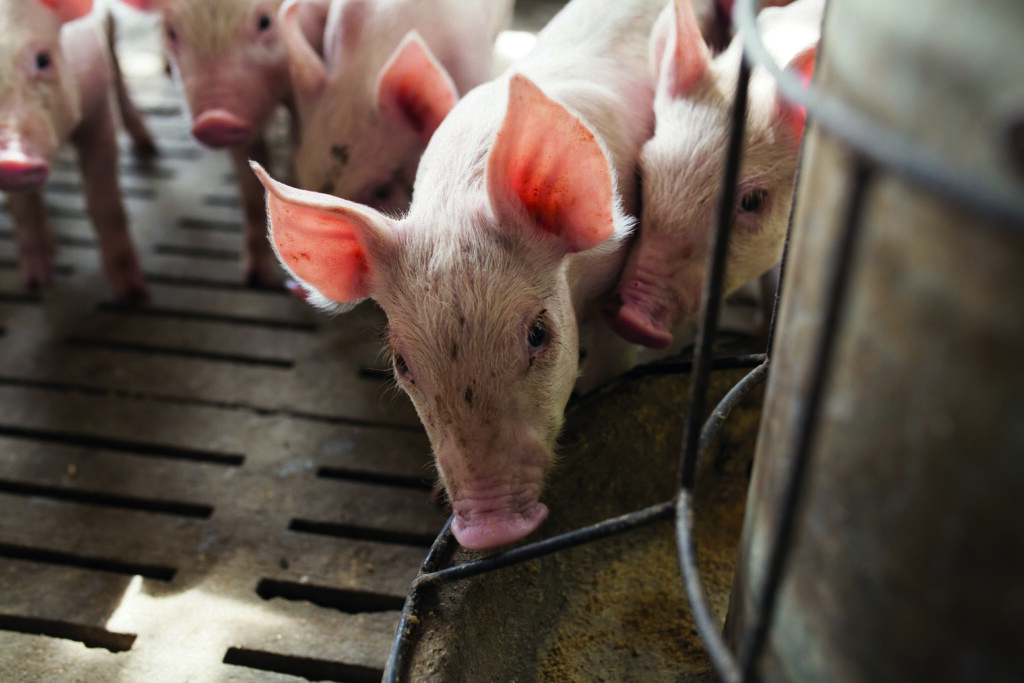The UK pig industry is an ‘exemplar’ for other industries at home and abroad and should have little to fear from the drive to reduce antibiotic usage on farms, according to Defra’s deputy Chief Veterinary Officer, Simon Hall.
In an interview with Pig World, Simon Hall also urged the pig industry to continue making the case for support from Government to achieve its targets, stressing it was in ‘listening mode’.
If the pig sector has sometimes felt portrayed within Government as the ‘bad boys’ when it comes to the antibiotic issue, Mr Hall appeared keen to suggest the opposite was in fact true.
“In the last year or so, the response of the pig industry has been quite impressive, and it certainly shows every indication of taking the issue seriously and understanding the importance of it,” he said.
“The National Pig Association, for example, showed a very responsible, proactive attitude in producing its Antibiotic Stewardship Programme in May. And the new e-Medicines (eMB-Pigs) book seems to be taking off very well.
“In taking all the appropriate measures to reduce antimicrobial usage, the pig industry is an exemplar for other industries at home and round the world.”
The pig industry would appear to at least be starting on the front foot with Government for what could still be a rocky path ahead.
Sector targets
Speaking just after the Government published its response to the O’Neill Review on antimicrobial resistance (AMR), Mr Hall said Defra hoped to have specific sector targets in place by mid-2017, only a few months from now.

With that in mind, he urged pig farmers who had not yet embraced eMB-Pigs to record their antibiotic usage to do so soon.
For farmers, the online service represented a ‘convenient place to collect data and demonstrate compliance with existing law’ and will soon provide benchmarking information, he said.
It will also provide the Government with far more accurate information on industry usage of antibiotics than it currently has from pharmaceutical companies’ sales data.
“Because many products are multi-species, the data does not tell us much about the volumes used by pig farmers specifically,” Mr Hall said.
“So providing Government with access to aggregated anonymised information will enable us to agree much more realistic, practical targets for improvement to be made by the industry.
“I see the pig industry has accepted the challenge and I think when we see that data we will understand more.”
Health and welfare concerns
While the industry is increasingly accepting of the need to act, organisations like NPA and the British Veterinary Association (BVA) have warned of the potential unintended consequences if the new targets to reduce usage are mishandled.
Mr Hall said he ‘absolutely accepted’ the need to avoid moving too far, too fast in a way that could jeopardise animal health and welfare.
“There certainly are situations of acute unforeseen disease outbreaks on farms where it is essential that effective antibiotics are available – and one of the reasons for a concerted effort on resistance is to make sure they are,” he said.
But he identified the preventative use of antibiotics, ‘without a defined purpose but simply as a precaution’, as the greatest concern and a key area where improvements can be made.
“Even when there is a defined problem, we need to make sure the right medication is being used alongside other control measures such as good hygiene and vaccination. It is a complex issue, which is why the NPA’s antibiotic stewardship programme which tackles all these problems is so good.”
He was adamant the pig industry will be capable of addressing the ‘reasonable targets’ the Government is discussing with industry, insisting doing so will be a ‘win-win for all farmers’.
“Better disease prevention through improved husbandry, better use of vaccines and a better environment can lead to not only reduced antibiotic usage but better health, productivity and welfare.
“There have certainly been some interesting pilots undertaken by farmers and vets to show what they can do with disease prevention and reducing antibiotic usage.”
Government support
The UK pig industry has been at pains to stress improving animal health and welfare requires investment in buildings and technology, something governments in Denmark and Holland have accepted in the form of considerable grant funding. The benefits there have been evident.
The industry wants the UK Government to take note. Mr Hall was cautiously supportive.
“Some Government money is being spent now, at least on programmes showing what can be done in terms of reducing antibiotics but certainly not in paying farmers for new buildings,” he said.
“EU exit is intended to offer new opportunities for providing farm support in a way that suits British farmers and British policy goals. At the moment the Government is in listening mode.
“We have obviously seen the NPA’s call for capital grants for new buildings – they need to put that forward as part of the industry’s overall ask for the new post-Brexit world. But whether or not it will be successful will depend on many issues beyond veterinary ones.”
‘Critical drugs’
The Government’s AMR policy will see ‘increased regulatory oversight’ including restrictions or even bans on the use in animals of antibiotics of ‘critical importance to people’.
But Mr Hall played down the prospect of a ban on drugs like colistin, which some bugs found in humans and livestock have become resistant to, according to research in China published last year.
Mr Hall said: “There is very little colistin used in livestock in the UK now, partly because vets and the industry have understood it is of increasing concern to our human health and they want to maintain the effectiveness of this medicine.
“It is already something that would only be used as a last resort and where it was shown to be the only possible solution to the farmers’ problem.
“To go beyond that to an outright ban is not currently the intention of the Government. A ban is a pretty blunt instrument and would preclude the use of valuable medicines in truly exceptional circumstances when they are needed.”
But on the wider question of additional restrictions he added: “If, however, the voluntary industry measures were shown to be ineffective, you have to allow for the possibility that further legislation would be required.”
Scientific justification
While most people within the livestock industry acknowledge changes are coming in how antibiotics will be used on farms, many are still unsure about, or even openly question, the scientific justification behind it all.
Mr Hall insisted the reasons were sound. There is ample science, he said, to demonstrate that through simple evolutionary processes and overuse of antibiotics, bacteria quickly develop resistance. In some cases, resistance genes can be passed from one bacterium to another.
“Science and practical experience shows the more we use antibiotics to treat certain conditions in certain species the more quickly they will become ineffective,” he said.
But he acknowledged it was ‘really difficult’ to prove the extent to which antibiotic usage in animals contributes to the human problem.
He said: “Other than in just a few specific examples, conclusive evidence and actual numbers around the use of antimicrobials in animals and the consequence for AMR in human pathogens isn’t strong.
“But given that uncertainty we still need to change for two reasons. While there is a rational possibility of overuse of antibiotics in livestock affecting people we should act for the greater good.
“It is also in the farmers’ own interests because we also need to have access to antimicrobials for use in appropriate ways to control animal diseases.”




